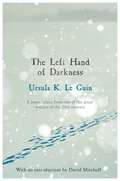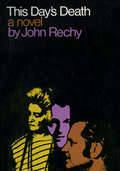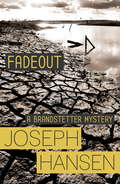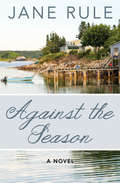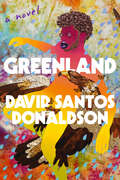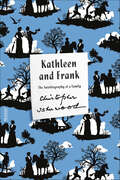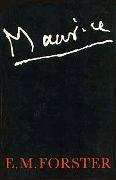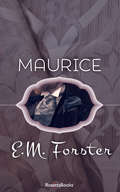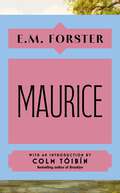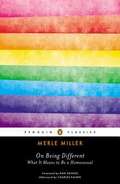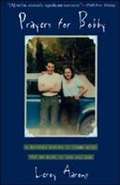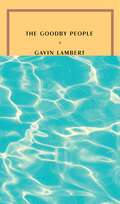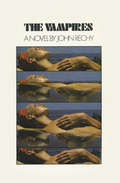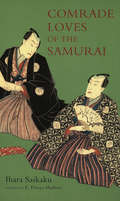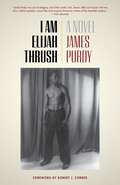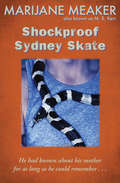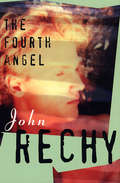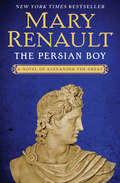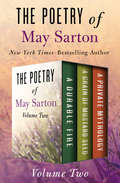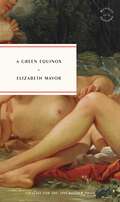- Table View
- List View
The Left Hand of Darkness: A groundbreaking feminist literary masterpiece (S.F. MASTERWORKS #172)
by Ursula K. Le Guin'A rich and complex story of friendship and love' GUARDIAN'It's a giant thought experiment that's also a cracking good read about gender' Neil Gaiman'Love doesn't just sit there, like a stone, it has to be made, like bread; remade all the time, made new' Two people, until recently strangers, find themselves on a long, tortuous and dangerous journey across the ice. One is an outcast, forced to leave his beloved homeland; the other is fleeing from a different kind of persecution. What they have in common is curiosity, about others and themselves, and an almost unshakeable belief that the world can be a better place. As they journey for over 800 miles, across the harshest, most inhospitable landscape, they discover the true meaning of friendship, and of love.
This Day's Death: A Novel (Books That Changed the World)
by John RechyA novel on the legality of love from the author of City of Night, &“one of the few original American writers of the last century&” (Gore Vidal, public intellectual and author of I Told You So). A man confronts the twin nightmares of death and silent injustice in John Rechy&’s third novel. While juggling the care of his ailing mother, a young law student stands trial in Los Angeles on a charge that exposes him to the depths and intricacies of society&’s twisted conceptions of justice and privacy. In This Day&’s Death, &“[Rechy] deals with experience from the inside, and it&’s possible he offers us more unevaluated and uncodified homosexual feeling than any writer in the United States today&” (The New York Times). Praise for John Rechy &“Rechy shows great comic and tragic talent. He is truly a gifted novelist.&” —Christopher Isherwood, author and playwright &“His tone rings absolutely true, is absolutely his own, and he has the kind of discipline which allows him a rare and beautiful recklessness. He tells the truth, and tells it with such passion that we are forced to share in the life he conveys. This is a most humbling and liberating achievement.&” —James Baldwin, novelist, playwright, and activist &“His uncompromising honesty as a gay writer has provoked as much fear as admiration . . . John Rechy doesn&’t fit into categories. He transcends them. His individual vision is unique, perfect, loving and strong.&” —Carolyn See, author of Dreaming: Hard Luck and Good Times in America
And Chaos Died
by Joanna RussJoanna Russ, famous for her feminist sci-fi novel The Female Man (1975), weaves together a bizarre (and difficult) novel filled with strange images, peculiar characters, and a fragmented/layered/bewildering narrative structure. And Chaos Died (1970) is a startlingly original take on the staple sci-fi themes of telepathy and overpopulation.
Fadeout (Dave Brandstetter #1)
by Joseph HansenDave Brandstetter stands alongside Philip Marlow, Sam Spade and Lew Archer as one of the best fictional PIs in the business. Like them, he was tough, determined, and ruthless when the case demanded it. Unlike them, he was gay. <P> Joseph Hansen's groundbreaking novels follow Brandstetter as he investigates cases in which motives are murky, passions run high, and nothing is ever as simple as it looks. Set in 1970s and 80s California, the series is a fascinating portrait of a time and a place, with mysteries to match Chandler and Macdonald. <P> In Fadeout, Dave is sent to investigate the death of radio personality Fox Olsen. His car is found crashed in a dry river bed. But there is no body - and as Dave looks deeper into his life, it seems as though he had good reasons to disappear.
Fadeout: Dave Brandstetter Investigation 1 (Dave Brandstetter)
by Joseph HansenAfter forty years, Hammett has a worthy successor' The TimesDave Brandstetter stands alongside Philip Marlowe, Sam Spade and Lew Archer as one of the best fictional PIs in the business. Like them, he was tough, determined, and ruthless when the case demanded it. Unlike them, he was gay. Joseph Hansen's groundbreaking novels follow Brandstetter as he investigates cases in which motives are murky, passions run high, and nothing is ever as simple as it looks. Set in 1970s and 80s California, the series is a fascinating portrait of a time and a place, with mysteries to match Chandler and Macdonald.In Fadeout, Dave is sent to investigate the death of radio personality Fox Olsen. His car is found crashed in a dry river bed. But there is no body - and as Dave looks deeper into his life, it seems as though he had good reasons to disappear.
Against the Season: A Novel
by Jane RuleA decades-spanning novel of sisterhood and family secrets from an &“extraordinary writer&” (Katherine V. Forrest). Born lame, Amelia Larson lives in the house that has been in her family for generations. Now she has a decision to make: Should she honor the dying wish of her sister, Beatrice, to burn her diaries? There are sixty-nine in all: one journal for each year of Beatrice&’s life since the age of six. Beginning in 1913 and traversing World War I and beyond, the diaries become a moving counterpoint to Amelia&’s life as they unpeel layers of family history. As the past starts to impinge on the present, her relations—then and now—come to vivid life. Told from alternating points of view, Against the Season opens an illuminating window into small-town life. As the sins and secrets of a family are revealed through the sometimes-faulty lens of memory, it is a story about the seasons of life and the ties that bind us even beyond death.
Greenland: A Novel
by David Santos DonaldsonA dazzling, debut novel-within-a-novel in the vein of The Prophets and Memorial, about a young author writing about the secret love affair between E.M. Forster and Mohammed el Adl—in which Mohammed’s story collides with his own, blending fact and fiction.In 1919, Mohammed el Adl, the young Egyptian lover of British author E. M. Forster, spent six months in a jail cell. A century later, Kip Starling has locked himself in his Brooklyn basement study with a pistol and twenty-one gallons of Poland Spring to write Mohammed’s story.Kip has only three weeks until his publisher’s deadline to immerse himself in the mind of Mohammed who, like Kip, is Black, queer, an Other. The similarities don't end there. Both of their lives have been deeply affected by their confrontations with Whiteness, homophobia, their upper crust education, and their white romantic partners. As Kip immerses himself in his writing, Mohammed’s story – and then Mohammed himself – begins to speak to him, and his life becomes a Proustian portal into Kip's own memories and psyche. Greenland seamlessly conjures two distinct yet overlapping worlds where the past mirrors the present, and the artist’s journey transforms into a quest for truth that offers a world of possibility.Electric and unforgettable, David Santos Donaldson’s tour de force excavates the dream of white assimilation, the foibles of interracial relationships, and not only the legacy of a literary giant, but literature itself.
Kathleen and Frank: The Autobiography of a Family (Fsg Classics Ser.)
by Christopher IsherwoodA pivotal book in Isherwood's career that reveals as much about him as the parents he set out to portrayKathleen and Frank is the story of Christopher Isherwood's parents—their meeting in 1895, marriage in 1903 after his father had returned from the Boer War, and his father's death in an assault on Ypres in 1915, which left his mother a widow until her own death in 1960. As well as a family memoir, it is a social history of a period of striking change, and a portrait of the world that shaped Isherwood and that he rejected.
Maurice
by E. M. ForsterNovel written in 1913 that describes the long and difficult process by which a typical product of middle-class suburbia realizes that he is a homosexual.
Maurice (Penguin Classics Ser.)
by E. M. ForsterWritten in 1914 by the Nobel Prize–nominated author of Howard&’s End, this intimate portrait of homosexual desire &“seems as relevant as ever&” (The Guardian). From early adolescence to his college years at Cambridge and into professional life at his father&’s firm, Maurice Hall plays the part of the conventional Englishman. All the while, he harbors a secret wish to lose himself from society and embrace who he truly is. Maurice&’s first love, Clive Durham, introduces him to the ancient Greeks who embraced same-sex attraction. But when Clive marries a woman, Maurice is distraught enough to seek a hypnotist who might &“cure&” him of his homosexuality. In his quest to accept his true self, Maurice must ultimately go against the grain of society&’s unspoken rules of class, wealth, and politics. Though Forster completed Maurice in 1914, he left instructions for it be published only after his death. Since its release in 1971, Maurice has been widely praised and adapted for major stage productions as well as the 1987 Oscar-nominated film adaptation starring Hugh Grant and James Wilby. &“The work of an exceptional artist working close to the peak of his powers.&” —The New York Times
Maurice: With an introduction by Colm Tóibín, bestselling author of Brooklyn
by E M ForsterForster's classic queer novel, with a new introduction by Colm Tóibín, bestselling author of Brooklyn and Long Island'A monument to a moment when change seemed possible'COLM TÓIBÍN'It shows the quality of a novelist at the height of his powers'SUNDAY TIMES'His heart leapt alive and shook him to pieces. It cried "You love and are loved."'Maurice Hall grows up in comfort and privilege near London, in a villa surrounded by pines, where all is convenience and ease. He progresses through a traditional English education, projecting an outer confidence that masks troubling questions about his unspoken desires.At Cambridge University, Maurice meets Clive, an assured older student, with whom he enjoys a close and intense relationship. Sneaking around college, climbing through windows and skipping lectures, Maurice begins to grasp a less conventional view of the nature of love. And then, on a trip to Clive's family estate, he meets Alec, the gamekeeper, and his emotional and sexual awakening reaches its height, opening up the possibility of a life that strays from the path he was raised to follow. But can Maurice overcome societal pressures, self-doubt and heartbreak to find happiness?Forster completed Maurice in 1914 but felt that it could not be published in his lifetime. It was not until 1971, the year after Forster's death, that the novel was finally published.
Maurice: With an introduction by Colm Tóibín, bestselling author of Brooklyn
by E M ForsterForster's classic queer novel, with a new introduction by Colm Tóibín, bestselling author of Brooklyn and Long Island'A monument to a moment when change seemed possible'COLM TÓIBÍN'It shows the quality of a novelist at the height of his powers'SUNDAY TIMES'His heart leapt alive and shook him to pieces. It cried "You love and are loved."'Maurice Hall grows up in comfort and privilege near London, in a villa surrounded by pines, where all is convenience and ease. He progresses through a traditional English education, projecting an outer confidence that masks troubling questions about his unspoken desires.At Cambridge University, Maurice meets Clive, an assured older student, with whom he enjoys a close and intense relationship. Sneaking around college, climbing through windows and skipping lectures, Maurice begins to grasp a less conventional view of the nature of love. And then, on a trip to Clive's family estate, he meets Alec, the gamekeeper, and his emotional and sexual awakening reaches its height, opening up the possibility of a life that strays from the path he was raised to follow. But can Maurice overcome societal pressures, self-doubt and heartbreak to find happiness?Forster completed Maurice in 1914 but felt that it could not be published in his lifetime. It was not until 1971, the year after Forster's death, that the novel was finally published.
On Being Different: What It Means to Be a Homosexual
by Merle MillerOriginally published in 1971, Merle Miller's On Being Different is a pioneering and thought-provoking book about being homosexual in the United States. <P> Just two years after the Stonewall riots, Miller wrote a poignant essay for the New York Times Magazine entitled "What It Means To Be a Homosexual" in response to a homophobic article published in Harper's Magazine. Described as "the most widely read and discussed essay of the decade," the article was developed into the remarkable short book On Being Different - one of the earliest memoirs to affirm the importance of coming out.
Prayers for Bobby: A Mother's Coming to Terms with the Suicide of Her Gay Son
by Leroy AaronsBobby Griffith was an all-American boy ...and he was gay. Faced with an irresolvable conflict--for both his family and his religion taught him that being gay was "wrong"--Bobby chose to take his own life. Prayers for Bobby, nominated for a 1996 Lambda Literary Award, is the story of the emotional journey that led Bobby to this tragic conclusion. But it is also the story of Bobby's mother, a fearful church goer who first prayed that her son would be "healed," then anguished over his suicide, and ultimately transformed herself into a national crusader for gay and lesbian youth. As told through Bobby's poignant journal entries and his mother's reminiscences, Prayers for Bobby is at once a moving personal story, a true profile in courage, and a call to arms to parents everywhere.
The Goodby People
by Gavin LambertFirst published in 1971, The Goodby People is perhaps the greatest novel ever written about post-Manson, pre-Disney Los Angeles. "His elegant, stripped-down prose caught the last gasp of Old Hollywood in a way that has yet to be rivalled." (Armistead Maupin)"The bisexual draft dodger living on the skids, the glamorous young widow in search of enlightenment, the skinny gamine from out of town who wants to make it in the movies . . ."* These are the people who inhabit Gavin Lambert's mordant portrait of Southern California at the end of the 1960s: forever swapping addresses, lovers, and dreams. They live in extraordinary, suffocating wealth; or else flirting with a Mansonesque cult; or else in a fantasy where golden-age actresses make ghostly visitations to comment on their daily life. All that binds them together is their common sense of aimlessness--and the clear, judgment-free eye of a British author trying his best to be a friend to each. Cool, incisive, yet essentially kind, and very much ahead of its time, The Goodby People unfolds "in the yawning chasm between real life in Los Angeles and the fantasies manufactured by its dominant business" (*Gary Indiana), and stands as Gavin Lambert's masterpiece.
The Vampires (Books That Changed the World)
by John RechyThe award-winning, New York Times–bestselling author of City of Night delivers a novel of manipulation, sexuality, and the supernatural. On a beautiful private island somewhere in the Caribbean, the rituals of witchcraft and Satanism suddenly take over the lives of a group of people, exposing and shaping their destinies. Richard, a millionaire who is the epitome of male beauty, is the host to a gathering of carefully selected friends for the purpose of a bizarre confrontation—unknown to them. These odd guests arrive from all corners of the globe by helicopter and speedboat and discover that they are strangely bound together by hate or love or an evil fascination. In the guise of a search for truth, the invited guests are by turns victims and victimizers during a ritual ceremony of evil. Utilizing the techniques of film—close-ups, long-shots, and sudden shifts of scene, garish flashes of colors—John Rechy blends the supernatural ingredients, violent sexuality, and depraved rites with the lush beauty of a sea island to create a world whose superficial beauty conceals dark and violent forces close beneath its surface. Praise for John Rechy &“Rechy shows great comic and tragic talent. He is truly a gifted novelist.&” —Christopher Isherwood, author and playwright &“His tone rings absolutely true, is absolutely his own, and he has the kind of discipline which allows him a rare and beautiful recklessness. He tells the truth, and tells it with such passion that we are forced to share in the life he conveys. This is a most humbling and liberating achievement.&” —James Baldwin, novelist, playwright, and activist &“His uncompromising honesty as a gay writer has provoked as much fear as admiration . . . John Rechy doesn&’t fit into categories. He transcends them. His individual vision is unique, perfect, loving and strong.&” —Carolyn See, author of Dreaming: Hard Luck and Good Times in America
Black Mountain: An Exploration in Community
by Martin DubermanTo the extent that Black Mountain is known today it is as the site of a now defunct experimental community located in the foothills of North Carolina--a forerunner and exemplar of much that is now considered innovative in art, education and life style. It is known, too, as the refuge, in some cases the nurturing ground, for many of the singular, shaping talents of our time: John Cage, Merce Cunningham, Buckminster Fuller, Charles Olson, Josef Albers, Paul Goodman, Robert Rauschenberg--men whose work has significantly affected the actuality as well as the mythology of American cultural life. Yet the full story of Black Mountain during its twenty-three-year existence (1933-1956) is more intricate and poignant than a recitation of the famous names associated with it. Its daily history is the story of a small group of men and women who founded a college based on an idea of community among individuals working and learning together; who attempted to find some consonance in their ideas and their lives; who risked the intimacy and exposure that most of us emotionally yearn for and rhetorically defend, but in practice shun. At its best, Black Mountain showed the possibilities of a disparate group of individuals committing themselves to a common enterprise, resilient enough to absorb the conflict and now and then even brave enough to be transformed by its accompanying energies. The echoes of Black Mountain's unique experiment are to be found in the current debate in our universities as to the measure of commitment and response between school and student; in the communes and alternative societies seeking integration between life and work. Perhaps the most innovative aspect of Black Mountain is Martin Duberman's effort to challenge the ideal of "objectivity" that has long been the hallmark of academic historical writing. By removing the protection of anonymity, that is by letting the reader see the actual process by which he interacts with the data--his feelings, fantasies and needs--Mr. Duberman has brilliantly converted "history" to life. Martin Duberman is Distinguished Service Professor of History at Lehman College, City University of New York. He was born in New York City and received his B.A. from Yale and his M.A. and Ph.D. from Harvard. He has received numerous awards and has written biographies, history, plays and novels.
Comrade Loves the Samurai
by Ihara Saikaku Edward Powys MathersIn old Japan, sexual love among the samurai was permissible, and often matured into lifelong companionships. Comrade Loves of the Samurai touches the subject of both normal and abnormal love with honesty and tenderness.
I Am Elijah Thrush
by James PurdyOn its surface, I Am Elijah Thrush is the story of Millicent De Frayne and her sensational half-century campaign to win the love of Elijah Thrush. Elijah, after ruining the lives of countless men and women, is finally in love “incorrectly, if not indecently,” with his great-grandson, Bird of Heaven. To support an unusual habit, a young Black man, Albert Peggs, reluctantly agrees to tell their remarkable story. It is in this telling that the ambitions, desires, and true natures of Elijah, Millicent, and Albert come to light. With a delicately controlled balance of whimsy and pathos, James Purdy gives us this comedy of the heroic, the tragic, and the truly bizarre.Met with critical bewilderment upon its initial publication fifty years ago, this new edition offers a Foreword by Robert J. Corber illuminating Purdy’s “complicated allegory” of objectification, desire, and race in the immediate post–civil rights moment.
Shockproof Sydney Skate
by Marijane Meaker M. E. KerrA uniquely witty novel exploring sex, freedom, and the process of growing upSydney Skate considers himself shockproof. For as long as he can remember, he&’s known that his fashionable Manhattan mother is secretly a lesbian, although he&’s never let on that he knows. He spends his summer days caring for snakes at the local pet shop before leaving for college at Cornell, shrugging off his father&’s demands that he skip college and join the exciting world of swimming pool sales for suburbanites.Far from throwing himself into work, Sydney can&’t seem to keep his thoughts from wandering to women. He has memorized the sex scenes of every book he&’s ever read in order to better seduce the opposite gender. When he&’s called to help remove a snake from a bathtub that belongs to the gorgeous and sophisticated Alison Gray, everything changes. But nothing could prepare him for his glamorous mother sweeping the girl of his dreams off her feet.This hypnotizing coming-of-age story captures the timeless ecstasies and struggles of adolescence, and has been a classic of lesbian literature since it was first published in 1973. Hailed as the Catcher in the Rye of the seventies, Shockproof Sydney Skate exposes the confusion of its time and remains keenly relevant to the sexual absurdities of today.This ebook features an illustrated personal history of Marijane Meaker including rare images from the author&’s collection.
The Fourth Angel (Books That Changed the World)
by John RechyFrom the New York Times–bestselling author of City of Night: a &“powerful work that may very well be Rechy&’s best&” (Kirkus Reviews). Compelling and ferociously relevant, The Fourth Angel is the story of four teenagers playing deadly games with drugs, sex, and one another. Behind a facade of tough cynicism, on a raging search for kicks, they explore the hot, dusty city, bent on trouble. There are three &“angels&”—Shell, Cob, and Manny—and their recruit Jerry, who becomes the fourth. Hovering in that uncertain limbo between childhood and adulthood, the four angels maintain a precarious balance among themselves and with the outside world. Each one is today&’s street kid: still tinged with innocence and capable of beauty, but at the same time, full of rage and violence, attempting to conceal an ugly past. Praise for John Rechy &“Rechy shows great comic and tragic talent. He is truly a gifted novelist.&” —Christopher Isherwood, author and playwright &“His tone rings absolutely true, is absolutely his own, and he has the kind of discipline which allows him a rare and beautiful recklessness. He tells the truth, and tells it with such passion that we are forced to share in the life he conveys. This is a most humbling and liberating achievement.&” —James Baldwin, novelist, playwright, and activist &“Fresh, beautiful, totally courageous and totally cool, passionate . . . His uncompromising honesty as a gay writer has provoked as much fear as admiration . . . John Rechy doesn&’t fit into categories. He transcends them. His individual vision is unique, perfect, loving and strong.&” —Carolyn See, author of Dreaming: Hard Luck and Good Times in America
The Man Without a Face
by Isabelle HollandCharles didn't know much about life ... until he met The Man Without a Face. "I'd never had a friend, and he was my friend; I'd never really, except for a shadowy memory, had a father, and he was my father. I'd never known an adult I could communicate with or trust, and I communicated with him all the time, whether I was actually talking to him or not. And I trusted him ...... Fourteen-year-old Charles desperately wants two things: a father and a way out. Little love has come his way until the summer he befriends a mysterious scarred man named Justin McLeod, nicknamed ""The Man Without a Face." Charles enlists McLeod's help as tutor for the St. Matthew's school entrance exams, his ticket away from the unpleasant restrictions of his home life. But more important than anything he could get out of a book, that summer Charles learns from McLeod a stirring life lesson about the many faces of love.
The Persian Boy: A Novel Of Alexander The Great: A Virago Modern Classic (The Novels of Alexander the Great #2)
by Mary RenaultA New York Times–bestselling novel of the ancient king of Macedon and his lover by the author Hilary Mantel calls &“a shining light.&”The Persian Boy centers on the most tempestuous years of Alexander the Great&’s life, as seen through the eyes of his lover and most faithful attendant, Bagoas. When Bagoas is very young, his father is murdered and he is sold as a slave to King Darius of Persia. Then, when Alexander conquers the land, he is given Bagoas as a gift, and the boy is besotted. This passion comes at a time when much is at stake—Alexander has two wives, conflicts are ablaze, and plots on the Macedon king&’s life abound. The result is a riveting account of a great conqueror&’s years of triumph and, ultimately, heartbreak.The Persian Boy is the second volume of the Novels of Alexander the Great trilogy, which also includes Fire from Heaven and Funeral Games.This ebook features an illustrated biography of Mary Renault including rare images of the author.&“Mary Renault is a shining light to both historical novelists and their readers. She does not pretend the past is like the present, or that the people of ancient Greece were just like us. She shows us their strangeness; discerning, sure-footed, challenging our values, piquing our curiosity, she leads us through an alien landscape that moves and delights us.&” —Hilary Mantel
The Poetry of May Sarton Volume Two: A Durable Fire, A Grain of Mustard Seed, and A Private Mythology
by May SartonThree compelling volumes of poetry from a feminist icon, poet, and author of the groundbreaking novel Mrs. Stevens Hears the Mermaids Singing.A Durable Fire: This collection borrows its title from Sir Walter Raleigh, who wrote, “Love is a durable fire / In the mind ever burning.” It is a fitting sentiment for a collection on solitude, wherein the author finds herself full of emotion even in seclusion. A Durable Fire is a transformative work by a masterful poet. A Grain of Mustard Seed: In this beautiful collection, Sarton explores dark and destructive femininity. She writes of “Crude power that forges a balance / Between hate and love,” finding an amalgam of dark and light within a single act. These graceful and nuanced poems join timeless ideas and specific moments in history. A Private Mythology: To celebrate her fiftieth birthday, Sarton embarked on a pilgrimage around the world. Traveling through Japan, India, and Greece, she captured her spiritual discoveries in this vivid collection of poetry. Arresting images and meditations on the differences between East and West are rendered in this “colorful, polished” winner of the Emily Clark Balch Prize (Kirkus Reviews).
A Green Equinox
by Elizabeth MavorShortlisted for the 1973 Booker Prize, A Green Equinox is a beguilingly Rococo &“study of love, considered in turn as companionship, sickness and mystic devotion . . . a book whose unusual infatuations are well worth lingering over, and puzzling out&” (Russell Davies, The Observer).Hero Kinoull is an antiquarian bookseller whose sedate life in the picturesque English town of Beaudesert is turned upside down between the spring and autumn equinoxes of a single year. First her quiet but forbidden liaison with Hugh Shafto, the curator of the country&’s finest collection of Rococo art, comes to an abrupt halt when she develops an adoration for his straight-talking, do-gooding wife Belle. But this relationship leads to other, even more unexpected feelings for Belle&’s widowed mother-in-law, the majestic Kate Shafto, who spends her days tending her garden and sailing her handmade boats in the waters of the miniature archipelago she&’s constructed in a disused gravel-pit. Published two years after Elizabeth Mavor&’s most famous work, The Ladies of Llangollen—a biography of two eighteenth-century Irish gentlewomen who scandalized their families by eloping to Wales, where they lived together on their own terms—A Green Equinox is itself an intrepid exploration of gender, female sexuality, and passion: romantic, carnal, and cerebral.
